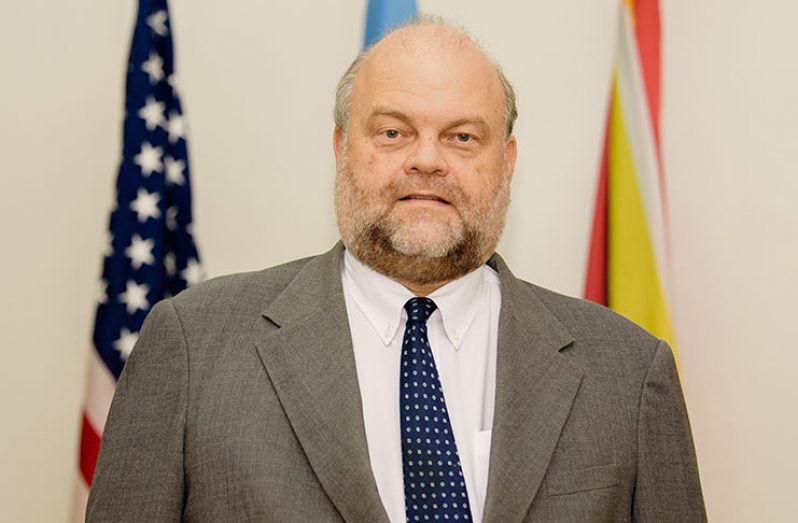–U.S. envoys says it’s not for him to say how much to spend on policing
“T’S a slow process, but it’s coming around,” says U.S. Ambassador to Guyana Mr Perry Holloway of the correlation between the United States Drug Enforcement Agency (DEA) and local anti-narcotics agencies.
But the one fly in the ointment, however, seems to be the limited human resources to fight crime.
“Guyana doesn’t have enough police people, whether it be CANU, GRA investigators, police anti-narcotics,” Ambassador Holloway said.
“If you look at the number of police per capita in Guyana, it is one of the lowest ratios in the whole world.
“We are going up against bad guys who are well funded, have motivation, and don’t have to play by the rules, and you are already understaffed, then that’s a problem,” he told the Guyana Chronicle in an exclusive interview recently.
But the issue, of course, is not limited to that of sourcing human resources, but having them properly trained to do the job as well.
On that score, the ambassador commended those persons who chose to join the Guyana Police Force and related agencies such as the Customs Anti-Narcotics Unit (CANU) and the Guyana Revenue Authority (GRA).
“It is a constantly evolving game, this fight against narcotics,” he said, adding:
“These guys are changing their methods, networks and everyone has to be in marine mode all the time.”
FUNDING A KEY FACTOR
And while there is a dire need to boost human resource capacity within the police force, the ambassador believes that funding is another crucial factor in the fight against crime.
“But that’s a decision between the people of Guyana and their government; about how much money they want to spend on policing,” Ambassador Holloway said, adding:
“I can’t tell you what the amount of money is, but I can tell you that by any standards you look at, the number of police Guyana has per capita, and dealing with crime, is very, very low, especially when you factor in the size of this country, which is very, very large, and the infrastructure for the police to project their presence… it is a very difficult job they have. There is no silver bullet.”
But to get back to the matter of the working relationship between the DEA and the local law enforcement agencies, particularly CANU and the GRA, Ambassador Holloway said it couldn’t be better.
“We see from those institutions, and the government, a commitment to want to cooperate and collaborate… So that is going well,” he said.
As to the public’s anxiety at the sloth where arrests are concerned, Ambassador Holloway said he can well understand the frustration, but that’s just the way it is; that narcotic cases are complicated matters that can sometimes take a number of years before any arrests can be made and prosecution can be done.
“Those investigations often take years of information-gathering and intelligence-sharing before you see any hard results,” he said, adding:
“The DEA’s job here is not to kick down doors or be the policeman of Guyana; they are here as law enforcement attachés primarily, to work on cases that have a U.S. connection.”
THE BIG PLAYERS
It’s no secret that the majority of drugs coming into Guyana are destined for the U.S., and it is those cases and large organisations that are being monitored by the DEA, and not necessarily street-level drugs.
With the presence of the DEA here, since its office opened last February, there have been increased levels of information-sharing.
“It is a two-way street: they share information with us as is legal and appropriate, and as often as we get information that has nothing to do with a U.S. nexus or U.S. case, but is very useful to the local police, we share that very freely,” he said.
Additionally, the U.S. government and the DEA have been facilitating lots of training and technical assistance for personnel in the anti-narco field. Over the last year, the U.S. State Department’s International Narcotics and Law Enforcement Affairs Bureau has also provided much-needed training.
“We send Guyanese police, CANU and other officials to different parts of the world for training. We do training here via video conferencing; we bring trainers in,” Ambassador Holloway said.
“I’d say overall, things are going well. But unfortunately, the bad guys have a lot of money; they have a lot of motivation and don’t have to follow the rules, so it is a very tough battle in any country,” he added.




.png)









